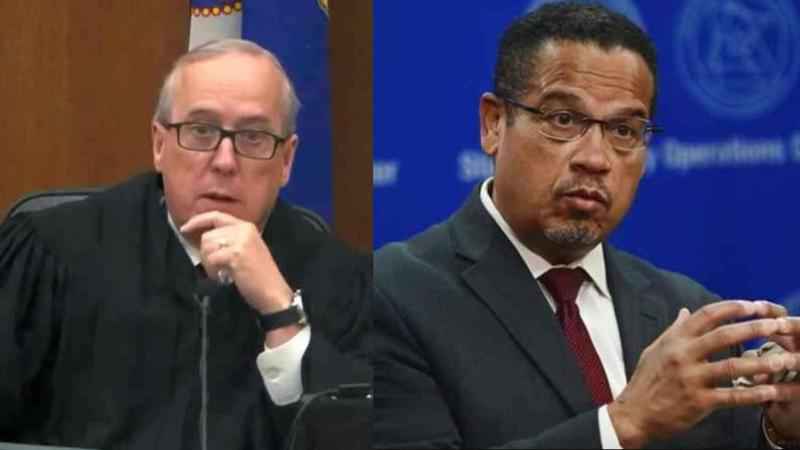Judge won’t change ‘trauma’ wording in Chauvin memo
[anvplayer video=”5043003″ station=”998122″]
Less than a week after Minnesota Attorney General Keith Ellison penned a letter asking the judge who oversaw former Minneapolis police officer Derek Chauvin’s trial to remove or modify some language used in the sentencing memorandum, the Hennepin County Court decided they will not make any changes to the memorandum.
In the decision filed on Tuesday, Hennepin County Judge Peter Cahill stated his the letter submitted by the attorney general was "misperceived" on what the focus of the court was in this case. Cahill explained the focus was on Chauvin’s conduct towards George Floyd on May 25, 2020, "the basis upon which the jury found the defendant guilty of unintentional second-degree and third-degree murder and second-degree manslaughter."
Additionally, Cahill said the court neither "found nor wrote in the Sentencing Memorandum Opinion that the four minor eyewitnesses upon… were not traumatized." According to the memo, the court wrote that "the evidence at trial did not present any objective indicia of trauma."
“One may just have listened to the testimony of Darnella Frazier and the other girls and just think about what they actually observed and I think that’s why the state didn’t feel any need to bring forth any additional evidence," said Mary Moriarty, the former Hennepin County chief public defender. “What do those four girls think of when they read that, if they did? How does Darnella Frazier feel about reading something like that, that suggests that there was no objective indication of trauma?”
In his letter, Ellison argued the wording used in the memo might minimize the experiences of the children present. The attorney general requested that the phrases "were free to leave the scene whenever they wished" and "were never coerced or forced by him or any of the other officers to remain a captive presence at the scene" be removed from the judicial opinion.

From left: Hennepin County Judge Peter Cahill and Minnesota Attorney General Keith Ellison.[KSTP (Cahill), AP (Ellison)]
However, Cahill argued that claim, stating that the use of that language was to indicate to the jury that those were the facts of the case; the juveniles for whom Ellison wrote concerns about were, in fact, free to leave the scene and were never "coerced or forced by Chauvin" or any of the other three officers to stay at the scene and watch Floyd’s arrest.
"It is certainly possible that the witnesses experienced some level of emotional trauma from this incident, but the State failed to prove it," Cahill wrote. He also said that while Ellison pointed to research that shows adults view Black girls as less innocent and less in need of protection, no evidence of that was presented prior to Chauvin’s sentencing.
"Be that as it may, it is the State that is injecting supposed racial presumptions in this case, not this Court," Cahill wrote. He said his sentencing order never mentions the race or ethnicity of the girls. He said the youngest, who was 9 years old at the time, and her then-17-year-old cousin are Black, but the other two teenagers, who are now 18, are white.
"Whether ‘adultification’ of ‘Black girls’ is, as the State insists, ‘common in American society, including in the criminal justice system,’ this Court emphatically rejects the implication that it played any part in the Court’s sentencing decision," Cahill wrote.
He also said that while Ellison complains that the court did not hold a separate sentencing hearing, prosecutors had a right to request one but did not.
“I was not surprised by it but I was disappointed Because I think Judge Cahill had an opportunity to model for other people in authority what you can do when you’ve made an assumption or a mistake and you’ve had that pointed out to you,” said Moriarty. “If he had just corrected the language, I don’t think it would have had any real legal relevance at all but it would have had a lot of importance in the system I think it would have set a really important precedent and would have been really important to many in our community, particularly in the Black community.
Ellison’s office said Tuesday that it is reviewing the judge’s order.
“This is a very tragic situation, you can’t overstate how tragic this situation is but judges can’t just sentence on a whim or based on emotion,” said Kevin Burke, a retired Hennepin County District Court judge. “There are very precise rules that judges have to follow and I think that’s what Judge Cahill did and that’s what his memo explained.”
Burke urges members of the community to read Cahill’s explanation.
5 EYEWITNESS NEWS asked Burke whether the possibility for an appeal could’ve factored into Cahill’s decision.
“You would like to say, ‘Oh, I don’t think about that,’ but you actually do if you’re a judge,” Burke said. “If Judge Cahill was wrong about the departure based on the juveniles – that creates an appellate issue. So the fact that he was, let’s say conservative and did not abuse that reason, takes that issue out for an appeal, which is actually to the state’s benefit.”
Burke said this could potentially play a role in the case against the other three former Minneapolis Police officers charged in Floyd’s death.
“They are presumed innocent but if they were convicted and if the state asked for a departure based upon the juveniles, the young girls, young women who saw this, presumably [the State] would probably want to ask for a hearing to present that testimony that they didn’t ask for in this case,” Burke said.
To see the complete filing submitted on Tuesday, see below, or click here if on a mobile device.